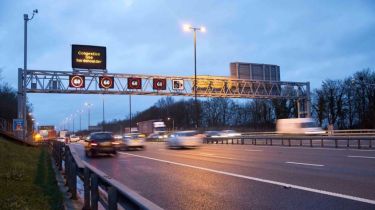Faulty smart motorway tech putting drivers in danger
BBC’s Panorama finds smart motorway tech is putting drivers at risk every day, with 397 power outages in last two years

The UK’s smart motorway network is plagued with technological faults that are not fixed for days at a time, leaving drivers at risk.
The revelation comes from the latest edition of the BBC’s Panorama programme, which also highlights figures that Auto Express reported in 2023, showing drivers are three times more likely to be killed or seriously injured when breaking-down on a smart motorway, compared to one with a hard shoulder.
The statistics have been linked to malfunctions with the smart motorway network’s detection and digital gantry system. A Freedom of Information request by the BBC found that, between June 2022 and February of 2024, there have been almost 400 power outages on smart motorways.
In the six months leading up to February, there were 174 outages – almost one per day – with one incident in July 2024 leaving a section of the M6 without power for five days, and another leaving a section of the M4 without power for 11 days. National Highways says there are “well-rehearsed contingency plans to deal with power outages”.
In 2022, official data shows there were over 2,300 faults with smart motorway radar systems, which are designed to monitor the flow of traffic in order to detect if a car has stopped. On average, it took five days for these issues to be resolved, yet National Highways’ own figures suggest one in ten stopped cars escape detection by the radar system – even when it is fully functioning.
The system is supposed to be backed up by a network of hundreds of CCTV cameras, however, many of these are no longer functioning. According to Panorama, some of these are even pointing into neighbouring fields or focusing on tiny spots on the road. National Highways admitted that while there is overlap in its network of cameras, “faulty cameras aren’t always covered by others”.
Consequently, whistleblowers within National Highways have resorted to contacting organisations such as the campaign group, ‘Smart Motorways Kill’, in order to get the message out regarding faulty equipment, as the lack of detection equipment means smart lanes will not be shut if there’s an incident, potentially putting lives in peril.
Since their introduction in 2010, “at least 79 people'' have been killed on smart motorways, with seven coroners calling for them to be made safer in the last five years alone. An anonymous National Highways traffic officer told the BBC that he believes that smart motorways aren’t safe because he’s “seen [them] fail too many times.”
In April 2023, the government succumbed to the backlash regarding smart motorways, cancelling all plans to build any more than the roughly 300 miles currently in operation in the UK. To improve safety on existing smart motorways, the government has also pledged £900 million of funding in order to increase the reliability of the technology, as well as install 150 additional emergency lay-bys.
Do you think smart motorways are a good idea? Let us know your thoughts in the comments section...
Find a car with the experts








